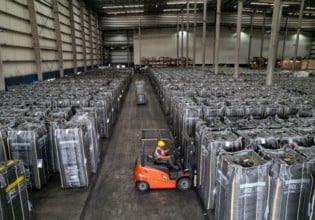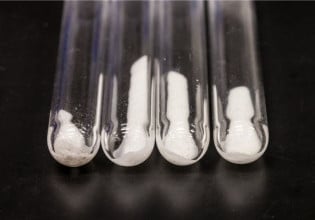Electrolyte for All Solid Polymer Batteries Can Operate at Room Temperature
Nippon Shokubai Co., Ltd., based in Osaka, has succeeded in improving the performance of electrolyte for all solid polymer batteries. All solid-state batteries using polymer electrolyte have features such as long life and high safety. On the other hand, polymer electrolyte has poor lithium ion conductivity. So it is necessary to heat the battery to more than 50 degrees Celsius.
The newly developed polymer electrolyte shows high lithium conductivity performance. The operating temperature of the battery can be lowered near to room temperature. Therefore, new applications of all solid polymer batteries can be expected.
Nippon Shokubai developed a type of solid electrolyte consisting of polyethylene oxide for a lithium polymer battery and started commercial production around 2013. Generally, ionic conductivity of polyethylene oxide polymer electrolyte is lower than that of non-aqueous electrolyte for lithium ion batteries, and the lithium ionic transport number is about 0.1 to 0.2.
At room temperature, lithium ions move very slowly through electrolyte. Therefore, in order to obtain stable performance, it was necessary to heat the battery to more than 50 degrees Celsius for accelerating lithium ionic transport.
Several studies to improve the lithium ionic transport number of polymer electrolyte have been reported, but most of them are not able to improve the performance because of the low ionic conductivity. Nippon Shokubai has introduced the original ionic conduction mechanism that can achieve a high performance.
The company's newly developed electrolyte film has almost the same ionic conductivity and the lithium ionic transport number more than five times higher than that of the conventional polyethylene oxide electrolyte film.
 Ionic conductivity and lithium ionic transport number. (click on table to enlarge)
Ionic conductivity and lithium ionic transport number. (click on table to enlarge)
The original electrolyte film has oxidation-reduction stability for lithium metal and 4V-class cathode active materials. The laminated cell battery fabricated using this technology exhibited extremely higher discharge characteristics than that of polyethylene oxide-based polymer. The dramatic improvement in battery performance leads to many potential benefits, including a shorter charging time, higher energy density, and reduction of battery-heating devices.
Nippon Shokubai will continue to contribute to improving the performance of polymer electrolyte for developing a new application. These research results are exhibited at a Nippon Shokubai booth at the Battery Japan 2020 exhibition, which will be held at Aomi Hall, Tokyo Big Sight, on February 26 (Wed.) to 28 (Fri.).






